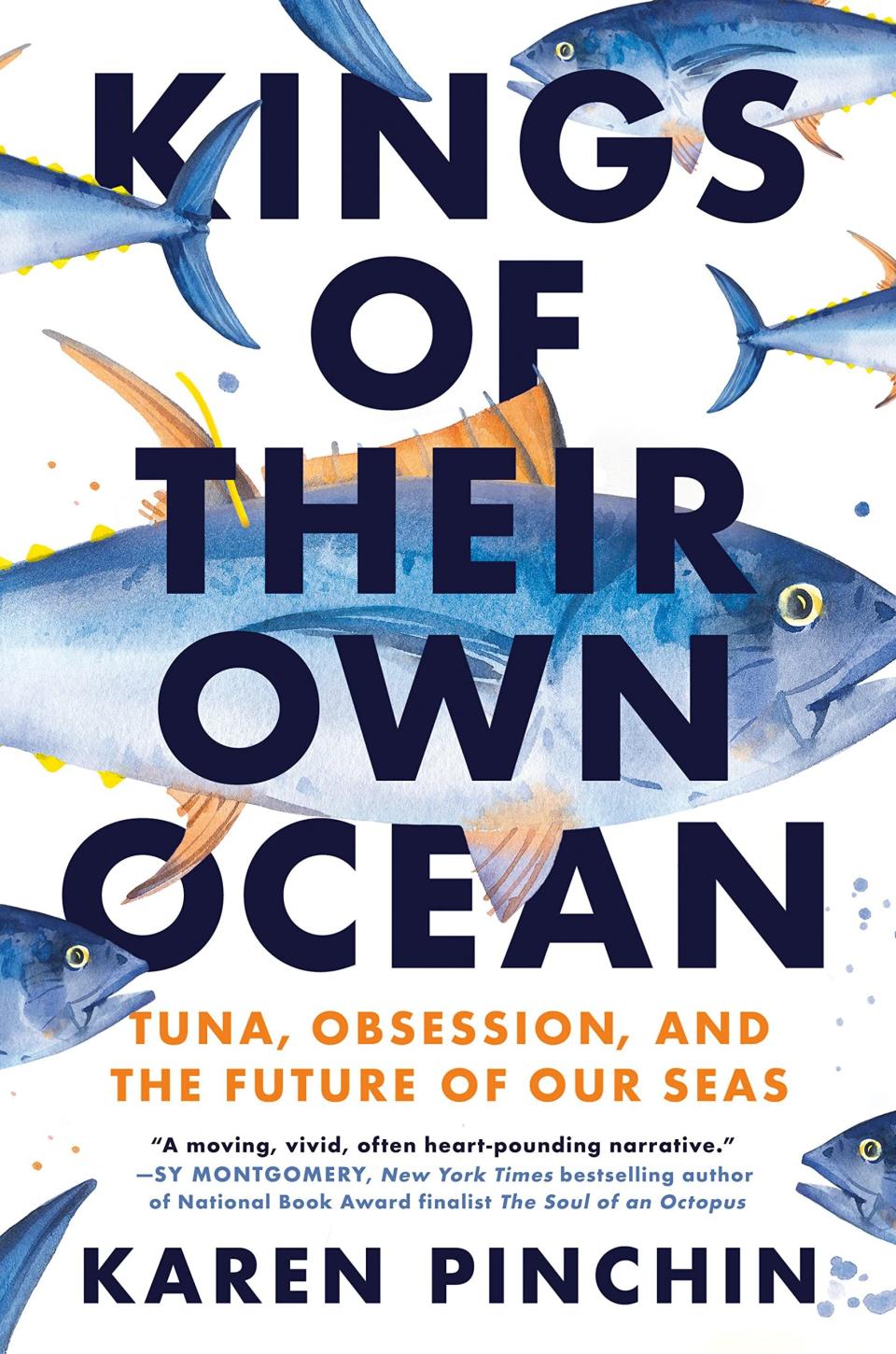"I'm Not Bad Luck": How I Deal With Sexism on the Open Seas

- Oops!Something went wrong.Please try again later.
"Hearst Magazines and Yahoo may earn commission or revenue on some items through these links."

On July 16, 1956 — the day she stowed away — graduate student Roberta Eike packed cookies, fruit, a change of clothes and socks and a green cloth bag full of plastic jars for plankton samples. She had already worked two summers at Massachusetts’ Woods Hole Oceanographic Institution but, because of her gender, hadn’t been allowed to join her male colleagues on data-gathering ship cruises. So instead, the bespeckled, bob-haired woman hid in a dark, dank bilge, waiting for their vessel to embark.
At 1 a.m., when she emerged feeling seasick, her sudden appearance caused an uproar; five minutes later the ship made a 180º turn back towards port. Furious, her supervisor turned her over his knee and spanked her before confining her to the captain’s quarters. Back on land, humiliated and stripped of her fellowship, Eike quietly left the institution.
She never worked as an oceanographer again, but her brave trip sent a clear signal to her female peers and the men forcing them to stay on land: keeping women off ships was unjust, and the archaic policy’s days were numbered.
After “Silent Spring” marine biologist and writer Rachel Carson, who talked her way onto cruises in the late 1940s and early 1950s, the next U.S. female scientist to sail did so in 1964; but it took until 1981 until the first woman joined a Woods Hole vessel engine department. One former steward, Mirth Miller, recalled that, during a training exercise on pirate attacks in the 1990s, “If the pirates came on, I was supposed to hide [the women] under the floorboards in the engine room.” Her crewmate, a second mate named Dee Emrich, fumed at the order. “I remember hissing across the table to the captain one day, ‘What makes you think I can protect you any less than you can protect me?’” Emrich later recalled.
While much has changed over the years — the sight of at least one female scientist onboard a research vessel is standard — it’s disturbingly bleak so much else hasn’t. At best, women face professional barriers, at worst, we run the risk of physical danger and assault.
Women have been seen as harbingers of bad luck for centuries
Each time I’m made to feel as though my gender precedes my experience and qualifications, assertions that women are “bad luck” on board especially drives me up the wall. Throughout history, examples abound of misogynistic policies and superstitions keeping women on land. “Out at sea, a storm may be lulled by a woman uncovering her body,” wrote Pliny the Elder in 77 A.D. That’s apparently why, for centuries, many carved prows sported brazenly bare-breasted figureheads.
In 1379, superstition didn’t stop British captain Sir John Arundel’s crews from abducting dozens of women and girls from a convent and taking them aboard their ships. When the weather swelled into a violent storm, according to one account, they blamed the women for the weather and, “in a frenzied state of mind, with the very hands with which previously they had amorously handled them, they now snatched them up and threw them into the sea; as many as 60 of the women, they say, were thrown overboard to be eaten by the fish and sea monsters.”
Those superstitions and prejudices persist today. Nearly every time I’ve set foot on a commercial vessel alone, there’s always one crew member who goes out of his way to remind me that, because I’m a woman, I’m bad luck on his boat. Sometimes I’m told the catches will suffer; sometimes there’s speculation the wind could pick up because I’m aboard. And despite my wearing the same heavy-soled boots and Gore-Tex clothing as male photographers who often accompany me, many fishermen can’t seem to stop themselves from trying to assist me up and down ladders, or telling me how they’d never let their daughters work onboard because of the physical risks — ones they’re only too happy to assume.
Since before recorded history, women have sailed and fished, worked onboard as cooks, laundresses, laborers, sex workers and eventually researchers, but today’s society still seems bizarrely in denial of that legacy. During the second half of the Victorian era in particular, women increasingly took to the ocean as stewardesses, chaperones and cooks. Their presence was often blamed for the traditional male sailors’ dying way of life, instead of the actual basis for their discomfort: steam engines that were replacing wind-powered ships. And that misplaced prejudice persists.
Prejudice can harm women's careers
Take Molly Lutcavage’s story. Born in landlocked Pennsylvania in 1955, the year before Eike’s short but revolutionary trip, the ocean fascinated Lutcavage, who grew up watching the televised exploits of French oceanographer Jacques Cousteau. When studying pre-med at the University of Pennsylvania in the 1970s, Lutcavage combined her passions for medicine and the sea by specializing in diving physiology, the study of how human bodies can descend into the ocean’s depths and survive. She had her future planned out, until one day her academic supervisor sat her down. “A woman will never be allowed on any rig,” he said.

Kings of Their Own Ocean: Tuna, Obsession, and the Future of Our Seas
amazon.com
$18.99
Lutcavage pivoted to study leatherback turtles as a marine scientist, and eventually focused on bluefin tuna. She traveled around the world, from Hawaii to remote coastal Nova Scotia, chasing fish alongside fishermen and graduate students as they tagged the creatures with scraps of plastic, releasing and tracking them to better understand their migration and breeding. Lutcavage pioneered electronic tagging efforts across the Northeast, and in 2016, was part of a team that discovered a whole new region where bluefin tuna spawn off the North Carolina coast.
After the publication of a co-authored paper on the subject in 2016, a handful of environmentalists condemned it as bad science, specifically accusing Lutcavage of being in the pocket of commercial fishermen who, they said, wanted to cast doubt on prevailing wisdom that the fish only spawn in the Gulf of Mexico and the Mediterranean. “I’m portrayed as a lone wolf,” said Lutcavage, in the aftermath of the controversy, who wasn’t even the lead author on the paper. “Even though the heads of the studies were all NOAA scientists, it was ‘Lutcavage’ that they went after.”
Seeding doubt in a female scientist’s expertise or reliability can profoundly influence a laboratory’s funding, like in Lutcavage’s case, or influence where and if academic papers get published, says Christina Hernández, past president of the Society for Women in Marine Science, a nonprofit advocacy group that works to build bridges directly between female scientists.
I've experienced similar barriers in my own career
Despite all Lutcavage’s achievements, ruminating on her origin story still fills me with rage. Even with all her ambition, intelligence and passion, she was forced to settle for her second-choice career. That logical compromise, this bending to outward pressures and societal expectations, is one that is one I recognize in my own career and in the lives of women I love and respect.
A few years ago, I was offered the opportunity to go to sea on an oceanographic research cruise. The trip was the opportunity of a lifetime, but it would have meant more than a month away from my husband and son. The social backlash within my community was furious and unequivocal: how dare I leave my family behind for that period of time? How selfish; how self-serving. After the cruise was delayed, I felt the sting all over again as those around me breathed a sigh of relief.
Yet even the chance to join a cruise is a privilege. Until only a few decades ago, most American research vessels didn’t even have bathrooms designated for women. For years, male administrators used this as an excuse for excluding female scientists, including Eike, from sailing around the world on ships that carried their male colleagues to new professional heights. “It would be dishonest were I to leave the impression that I was always a champion for women’s participation,” said one male colleague of Eike’s — who claimed to be her friend — soon after the incident. “I enjoyed purely fraternal sea-going along with the rest.”
Ocean science’s prevailing masochistic culture has long rewarded female scientists for acting like “men” — belittling trainees, punishing missteps and advocating a just-tough-it-out ethos. This has led to many of them passing on abuse they endured to their own graduate students, fueling a culture of fear and brutality and exacerbating the “leaky pipeline” of researchers who eventually drop away from the field. And make no mistake: monsters still prowl our oceans today. Last year, a full quarter of more than 1,000 female seafarers surveyed by The International Seafarers’ Welfare and Assistance Network said that “physical and sexual harassment occur[ed] frequently in my daily work routine.”
I have reason to hope that things will get better for seafaring women
Despite the daunting history, immersing myself in these stories ultimately gives me hope. In 2016, women earned half of the doctoral degrees in ocean science in the U.S., compared to 19% in the 1980s. Encountering seemingly insurmountable odds, many women I’ve interviewed are fighting to integrate their identities as women and mothers into their careers, imbuing their work with a perspective that is imaginative, interdisciplinary and deeply hopeful.
Decades after Lutcavage and other women of her generation transmuted broken aspirations into new ones, this new generation of female scientists are following in their footsteps. Reporting on the ocean, I've found myself awed by women's expertise, creativity, persistence and holistic approaches to their professions. When doors slammed in their faces, as it did for Lutcavage, women like Hernández crowbarred open windows for themselves.
“I think there’s a growing understanding for a need for more sensitivity in scientific spaces,” says Hernández. “How do we build the systems we need? By having a woman-dominated space you get to redefine what a leader is.”
As our climate changes and our oceans warm, I’m hoping a more equitable field of oceanography will find the best, fastest methods of adapting and protecting our planet. Indeed, allowing women to be their fullest selves within their professions remains our best bet to reconciling ourselves with our unruly seas.
Karen Pinchin's new book, Kings of Their Own Ocean, is available now from your favorite bookseller. This essay is part of a series highlighting the Good Housekeeping Book Club — you can join the conversation and check out more of our favorite book recommendations.
You Might Also Like

